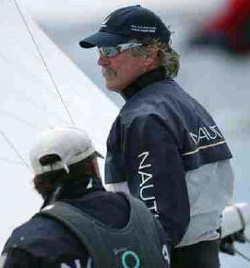
|
|
|
Scuttlebutt News: Conversations within the sport of sailing - Mark Reynolds It is often said how sailing is unique as a sport, where the opportunity is readiliy available to compete against the very best in the sport. Occassionally we get the chance to chat with them too.
The Star class continues to attract top sailors and all Olympic classes are costly to compete at the top level. The desire to succeed has pushed every Olympic sport to a higher level requiring a greater and greater level of commitment in time and money and the equipment cost is not the only issue. Look at the entourage that Dara Torres had! In sailing there still are many classes that have a mixture of amateurs and professionals and the Star class is certainly one of the best examples. There is a growing gap between the amateurs and pros, it's a challenge for the class to serve both groups. Equipment cost is an issue but it's not where most of the money gets spent anymore for the pros but it is an issue for the amateurs. The largest price increase in the boats (which have all been made in Europe for since the mid 80's) has been the collapse of the dollar against the euro over the last 7 years with the cost up 80% at one point last year compared to 2001. This has also increased the cost of campaigning in Europe for Americans. One big advantage that the Star class has is a market for used equipment and the fact that the boats stays competitive for a long time. This helps the pros reduce costs by retaining most of the value in their assets and helps the amateurs with good equipment at reduced prices. Frankly I don't think the new rule will make too much of a change, at least when it comes to reducing coach boats on the course. There are various reasons to limiting coaching; no one likes the power boats powering up and down the course chopping up the water and we all know now that the less fuel we can burn these days the better. There's the risk of collisions, I saw the result of a major one last summer in China with a top coach running into a top Tornado and we all know about Kimberly getting run over in Athens. The new Star rule will prevent those with coaches from getting information on the water before races and I think this is good. The problem is not as some think that the coaches are signaling their boats during racing, I've never seen that happen. The new Star rule is just like what the Farr 40's have and that didn't cut back on the coach boats. All the top guys will still have coaches out there like before. I do think we need to keep working on other ideas. It's funny but today many sailors think that without a coach they can't get out or back from the race course. We survived for years without tows, I remember Buddy telling me quite a few years ago that he'd never received a tow out or back from the race course in his life. At the minimum does every boat need their own coach boat? Maybe we should use the rule that has been used in the Olympics the last few times where the coaches have to stay behind the starting line for the whole race and perhaps also require multiple coaches in each coach boat. Perhaps that would encourage people to team up and would also add to the safety level. A total ban on coaching would be very hard to enforce, sometimes there's a fine line between spectators and coaches. My mom and dad often like to go out and watch me race and my dad is a Star World Champion, when is he a parent watching and when does he become a coach? Of course it's much easier to control at the Olympics because of the restricted zone but how about everywhere else? At the minimum, does every boat need their own coach boat? Maybe we should use the rule that has been used in the Olympics the last few times where the coaches have to stay behind the starting line for the whole race and perhaps also require multiple coaches in each coach boat. Perhaps that would encourage people to team up and would also add to the safety level. A total ban on coaching would be very hard to enforce, sometimes there's a fine line between spectators and coaches. My mom and dad often like to go out and watch me race and my dad is a Star World Champion; when is he a parent watching and when does he become a coach? Of course it's much easier to control at the Olympics because of the restricted zone but how about everywhere else? I was against the weight rule initially but crew weights were increasing which was limiting the sailors that could be competitive. Like we have discussed above the desire to succeed pushes athletes to make sure that they take every advantage and it was clear that a heavier crew weight makes the Star go faster in most conditions. Since the crew weight is slightly more effective than the skipper's weight the formula takes this into account, this is why it's not just a total weight like other classes. The result is that a very wide range of sailors are able to compete in the Star on an equal basis and you no longer need a huge crew. The formula has been fine tuned a few times over the years and is working well. A former 470 sailor can compete equally against a former Finn sailor. The range of sailors weights are far wider than any other Olympic class and this is one of the reasons that sailors can come from just about any other Olympic class and compete against each other in the Star. No, but just like in other Olympic classes most of the top teams could now be considered professional sailors, they don't have jobs outside of sailing and are supported by their federations and sponsors. If they are going to be the best in the world they must devote all of their time to sailing. There are some amateur skippers throughout the fleet that pay a small group of professional crews just like in other competitive classes today. No, I think the multiple race days have been more driven by the desire of amateur sailors to get more sailing in each day they put aside for sailing. The professionals like the idea of more races as well. The shorter races probably put a little less emphasis on equipment which some are happy about. Multiple races per day are more difficult though at the Worlds when there are well over 100 boats. No shift really. Folli boats have done well over the years but so have the Lillia's and Mader's. I won with Folli's but Torben won with Lillia's. This year a new Mader won but Mader has been around longer than Folli or Lillia. Also no one builder has ever won all 3 medals at the Olympics, fortunately there is great competition between the builders. There have always been custom or prototype boats as well and at this Olympics it was no different. Bill Buchan won with a custom boat in 1984. In that same year Andrew Menkart built a boat for himself and then later went into production. I also had a prototype boat in 1984 but switched back to an older boat for the trials. Marc Pickel has been building some boats for himself over the last few years and is now looking to go into production with these "P Stars", possibly in the US. John Dane used one from a brand new mould but Marc ended up using a 4 year old Folli as did the 4th place Polish team. The prototype boats ended up fairly evenly spaced through the fleet proving that the standard boats were hard to improve on. The 3 medal winning boats were from Mader, Lillia and Folli. The class probably has more builders now than ever before which is great, keeping the quality extremely high. One of keys to the success of the Star is that there is a small controlled amount of development. The boat slowly evolves to stay modern and it also adds another challenge to the athletes to get the most out of their boat. You can buy a ready to race high quality boat, but if you wish you can also build your own, which actually was more popular in past years. You can also modify your own boat, either by yourself or along with your builder. This is certainly a part of our sport, in fact the one that I enjoy most! Boat/Rig/Trailer - My current boat (built by Folli) was delivered to the 2007 Worlds and cost 35,000 Euros with all available options including a milled keel. All that was needed to race were sails and a cover. Hal and I were the top Americans and qualified the US for the 2008 Olympics finishing 12th. Mast - $4,400 Set of sails - $3,200 Coach boat - $25,000? Coach daily rate - Don't really know but roughly $400 to $1200 per day? Crew daily rate - I have no idea but probably similar to the coaching rate? Other - Airfares, cars, fuel, housing, food, entry fees, etc which made up the vast majority of mine and most budgets! back to top |







|


